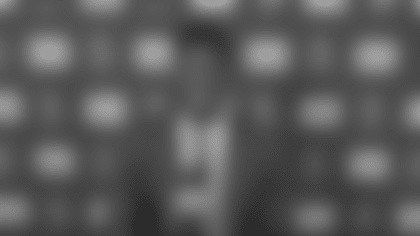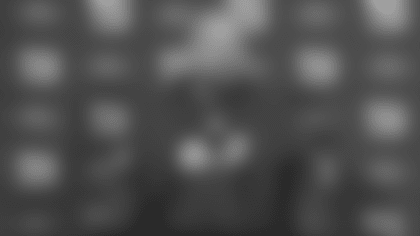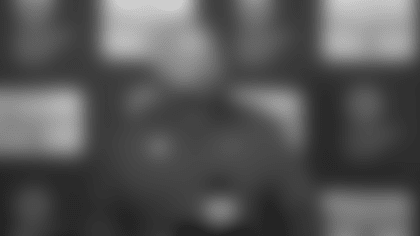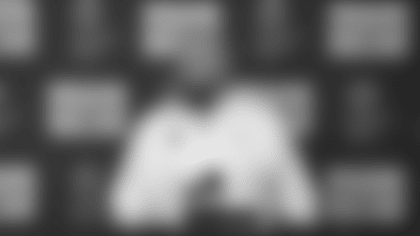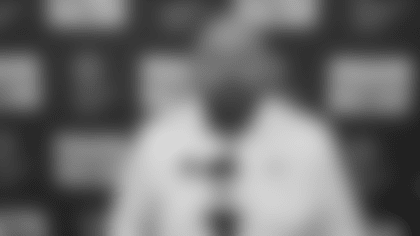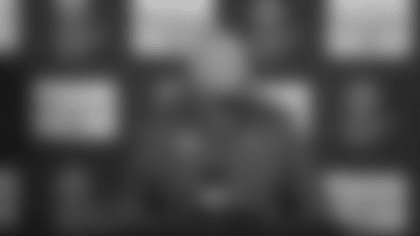RB Saquon Barkley
Q: How do you feel?
A: Bye week happening is always good because we got a little bit of time off, not just physically, but mentally. Obviously, your mind is still on football, but you spend some time with your family (inaudible). It's time to get back, we've only got six weeks left on the schedule, and try to finish up the season strong.
*Q: How much fresher do you feel, though? How much better does the ankle feel? *A: Realistically, it's only four days off that we had, probably four or five days off.
*Q: But two weeks in-between games, that's two weeks without taking hits. *A: Yeah, taking the hits is probably the best part to make you feel better, but yeah, I guess you could say everybody probably feels a little bit better when you get that little bit of time off. This is more just refreshing that I'm just happy to be back in the building, happy to be back to work, and I'm ready to get this thing rolling.
Q: You haven't been as involved in the passing game as much this year. Why do you think that's been?
A: I mean, we call the plays. We call the plays to go to me, and it's just like a choice route, but sometimes it's man, sometimes it's man and we went inside, but you have to hold players to the inside, sometimes you're bracketed, sometimes you're zone and we're just throwing a check down, or sometimes we catch them in man and I catch it like I did against the Detroit Lions and I catch it and I keep my feet and that probably would've been a touchdown, but even still we had like a 40-yard gain. But I don't think it's so much of just not being designed, or I'm not being active in design or put into the game plan to getting the ball in the air, it's just sometimes how they play it and how they scheme it, it's not there. But like I said, I'm going to continue to work and continue to get better at it and still try to get better at my routes, so when an opportunity does come and we catch them at the right moment, we capitalize on it.
*Q: One of the things that Daniel (Jones) does that people praise him for is he keeps his eyes down the field, and because of that, maybe he's checking the ball down less. Do you see that as maybe a symptom of-- *A: I mean, where do you win in that situation? When Eli (Manning) was our quarterback, I was getting the ball 'too much,' but everybody was saying 'Oh, he throws check downs too much,' so now that we're not throwing enough check downs, 'Oh, he's looking down the field too much?' Me, personally, I don't ever want to get in his way. Daniel Jones is a great player, a great quarterback, and is going to be a better player as time continues to go on, and he'll be one of the best in the league, I believe. But that's more coaching. Check downs, as always, are a safety valve for a quarterback, but be you. If you, in college we'd just say they dig it, the deep ball, they dig the deep ball, be you. Go out and play the game, however you've been doing it, you've been awesome so far, and hey, I'm going to be there for you when you need me to be there. But play your game and let's go out here and win some games.
Q: What did you do over the bye week? Did you just get away from football, did you watch film, or what?
A: I watched film, definitely. I just broke down myself, watched myself, what I can do better, how I can help the team do better. That's kind of the question that Coach (Shurmur) kind of challenged us to do, is we're talking about everyone is saying, 'Hate to lose,' or, 'Love to win, hate to lose,' I forgot how he put it, but he said the question would be, 'What can you do as an individual to help your team win?' That's what my major focus has been on.
Q: What did you see?
A: You see a lot. You see where I can do better at, and I guess it's a cliché answer, but it's how I truly feel, no matter if my numbers were higher than last year or higher than they are now, I can improve on every single thing. I want to be a better pass blocker, I want to be better at catching the ball out of the backfield, in-between, outside the tackles, literally all in all. I want to be one of the best players in the league one day, if not the best player in the league one day, I want to have that status, and I know that comes with the mindset of getting better every single day and putting your team first. So, I know I have to work on my little things for that to happen.
Q: When you're a guy who's lost a lot of games, going all the way back to high school, how do you guard against getting too frustrated or maybe pressing too much, trying to make something happen in a game?
A: That's what I felt like watching film. I saw I kind of, I think—I'm not going to say you guys—but I allowed, I don't know what it was, for me not to be me. I don't care, that's who I am, and that's getting back to this week. I'm just going to go out there and ball and have fun and go out there with my brothers, and whatever happens, happens. I'm not going to be worried about if he's hitting it too much or if he's not doing this or doing that. The reason I got drafted here is the reason I'm one of the best running backs in the league, and I'm just going to go out there and play and do what I do.
Q: Did you feel like you were pressing too much those first 10 games or so and trying to do too much?
A: I mean, no, because I think there's times where I did too less, where, say if a guy got beat quick, I would just take what they give me. I would just, not go down with ease, but just be more focused on securing the ball and live for another down, where there's times I can make that play and make someone miss and do what I do best. So, I'm not worried about pressing it, I'm not worried about not doing too much or doing too much, I'm worried about going back and playing how I know how to play, how I've been playing my whole life since I was a little kid. That's the message that my dad told me since I was a little kid. People tried to change my running style in high school and middle school, there's always someone. So, I'm just going to go out there and have fun, and that's the biggest thing. Have fun, be a little kid, and just try to ball out for my brothers.
Q: Why do you feel you got away from that?
A: I don't know, that's a good question. That's a good question, and if I do know the answer, that's for me to know and not for you guys to know. That's for my family to know. But I watched film on myself and I'm just going to go back to trying to have fun and play ball. I look at it like this, no matter what it is, 2-8, 8-2, great season individually or not, whether I missed some games or not, at the end of the day, I'm living the dream, I'm playing the game I love. There are so many people that would love to be in this position that I'm in, so I'm going to take advantage of it and have fun with it.
*Q: How do you study your pass protection? What do you see that you can do better? What do you see as the reasons why it's not up to par for you? *A: It's a fine line. One, you've got to understand the defender that you're going against. Some people are versatile, like a Jamal Adams, he's a guy who can switch it up, he can bull rush, he can swim move you, he knows how to use your momentum. But there are some guys who are just straight bull rushers, some guys who aren't going to focus on you, they're trying to focus on containing the quarterback in the pocket. But the biggest thing that I have to focus on is hands. Just use my hands and time it at the right time, and not duck my head. That's the biggest thing. Squat down, angle down, use my hands. I got beat a couple times this year, but it's how you learn from it, how you move on from it, and I watch film on it, put it in the past, and I'm going to get better.
Q: Coming off the last game, people always say about the bye, if you win the game it's great, you've got two weeks to be happy, if you lose the game, two weeks. Coming off, for yourself, that game you had against the Jets, and the whole team, the numbers I'm sure are something you thought you'd never see. Does that stew in you, and will you take that onto the field with you in Chicago? Or will you put it away?
A: Put it away. It was one of those games where you watch the film and you just put it away. I did research and I was like, 'I have to be the first back ever to have a game like that.' Then, I did research, and I'm not trying to put myself on that level and compare myself to that person, but Barry Sanders had a game where he had 16 carries and zero yards against the Green Bay Packers in the playoffs. I don't think that stopped him from having a great career. If anything, I would think it pushed him and motivated him to be better. So, is it motivating me to be better for this next game? No, but there's going to be times when you're in a funk. There's going to be times when things aren't going your way. Obviously, I would love to make it go my way, I would love to have 13 carries and 300 yards, trust me. But I'm not going to get down on myself. The type of player I want to be, the type of leader I want to be, I'm not going to let that affect me. I think about the people who I admire who had games, whether its basketball, LeBron or Kobe, they've probably been in a shooting funk before, but you learn from it and you get better at it. So, that's the type of player I want to be, and that's what I'm going to do.
*Q: You talked about getting back to being yourself on the field. Have we seen that this year yet? *A: Yeah, me personally, I think so. I think you have, I've just got to be more consistent. I was having a conversation with him, actually, and Kim (Jones) the other day and people were like, 'Oh, sit him out. Sit him out one.' That's absurd to me, that doesn't even make any sense. But when people were like, 'Sit him out, he doesn't even look the same,' like, if you guys really want to, we could sit down and I could show you clips where boom, like you'd be like, 'Oh, that's the same guy we saw last year.' It's the NFL, people adapt, coaches scheme. I've heard coaches come up to me after games and they literally could tell you what the game plan was, but at the same time, even though I might not be having as much success, offensively wise, we lost to the Jets, 34-27. I let up one touchdown, I've got to stop that, but we've still put up a lot of points on the offensive side. So, we've just got to figure out how to turn those into a game.
*Q: You mentioned at times in your life talking to family about not letting people change who you are, your running style. Are you talking about returning to the guy who can take it to the end zone on any given play? Like looking for that extra angle, looking for that big play that changes the game, that you're not doing that enough? Is that what you mean? *A: I wouldn't say I'm not doing that enough but going back to just having fun. That's mostly what I want to do. When I say go back to being the guy who I am, that's who I am. Have fun. When I score a touchdown run, celebrate with my teammates. Be that guy on the sideline, be vocal. That's all it is, just go back and have fun and spend good time with your teammates, as you can see with Sterling Shepard telling me to wrap it up.
Q: Is it as simple as taking what the game gives you?
A: Yeah, taking what the game gives you, but what you've also go to understand is, if that's the case, if I take what the defense gives me, then the defense is on ball and doing a really good job and I'm just taking what they give me, then I'm probably not trying. I feel like I'm not trying. That's the biggest thing really that I want to get to. Even though, yes, the defense is going to make plays, it's the NFL, but sometimes I can make that person miss or make two guys miss and it might be so simple as making two guys miss and getting a five-yard gain. It might be so simple as, I'm not saying make a guy miss and go 70 yards, it could be so simple as just not getting tackled in the backfield, getting back to the line of scrimmage, or getting above the sticks to keep the sticks moving and put us in better field position. That's what I'm going to try to do.
*
Q: Are you going to jump over anyone again?*
A: I haven't jumped over a guy this year. I don't know if this week, but I've got a couple more games to get that done.
*Q: It happened to be against this team, that's why I said it. *A: It was (Adrian) Amos, he's not there, he's in Green Bay. He's my dog, but I haven't heard of someone this week. Yeah, I'm going to go back to having fun. That's all it is. Like I'm saying, I'm just going to be taking advantage of the opportunity, I'm blessed. God blessed me to be in a position of living my dream, and I'm going to take advantage of it.
*Q: What about the challenge of this Bears linebacker corps? *A: I was about to say, you haven't asked me anything about the Bears. They're the Bears. That's really the only thing I can say. They are elite. They're stacked in every single category, linebackers, the front five, they play a 3-4 but it's really like five guys on the line, the back end with Eddie Jackson, he's tremendous. (Ha Ha) Clinton-Dix is tremendous. (Leonard) Floyd, all those guys can probably be Pro Bowl players. So, that's always a challenge to go up against those guys. I remember last year when I went up against those guys, they made it clear and known within the first two series that they want my best, so I know they expect it, and I expect their best, too.
*Q: Trubisky doesn't mind running the ball, does he? *A: No, definitely. So, we have to be aware for it and be aware of that. He's definitely athletic, they like to get him out of the pocket, get him moving and things like that. They used to get him off the spot, so we've got to be aware of that as well.
*Q: Coach Bettcher was talking to us and he was talking about the plays the defense isn't making because eyes aren't in the right spot, not getting enough leverage— how much of it is a technical thing and how much of it is that guys are just missing their assignments? Or is that considered part of the assignment? *A: That's considered part of it. When you have bad eyes, and you lose your leverage, or you don't come off for the right guy or whatever the case may be, that's all part of it. I think it's been, going back and watching the film, that's happened too many times this year. They've obviously been turning into some big plays. That's one thing we have to get corrected.
*Q: How do you stop it? *A: The onus is really on the players. Obviously, you can point your fingers at different people, but really, it's just on the players. Week in and week out, during the week, getting in your playbook, understanding what the other teams are trying to do, what they are trying to get to. Like I said, the onus is on us.
*Q: Does it ever create a trust issue in a sense that so and so has been missing his assignments so I'm covering for him, but at the same time, I'm losing my man? *A: No, at the end of the day, you talk about it at the beginning. Like I said, you've got to believe in the guys that you're going out there to play with. As far as the trust, it's just one of the things where you've got to grab the guy and be like, 'look, this is what we need to do.' You've got to be together through the good and through the bad. We can't let the circumstance change who we are. We said at the beginning we were going to go through this thing together, regardless of how we look. Obviously, it's not the situation we wanted to be in, but you can't change who you are, and we've still got to ride for one another.
*Q: How do you prevent the splintering? It would be easy to do in these situations. *A: Yeah, it would be. That would be cowardly, though. Like I said, at the beginning of this thing, when we all got together, we talked about how we were going to be together. Whether it was good, whether it was bad, whether it was ugly, or whatever the case may be. If you're a type of guy that likes to point fingers or whatever the case may be, you're not built for this because at the end of the day, it's not always going to be good, it's not always going to be pretty.
*Q: What's the appropriate level of pissed-offed-ness that this team needs to be at? *A: Yeah, it should be high. It should be high because, again, there are times out there where we go out there and look like a team capable of doing some really great things. Then there are times where it doesn't look as such. You should be mad, you should be pissed off. But at the end of the day, that doesn't mean that you're out here pointing fingers or whatever the case may be. Everyone should be upset.
*Q: I look at Tom Brady and he looks like he wants to punch somebody in the face because he feels like he's struggling because they've not won. Are the people in this locker room, do you feel they are at the right level of sick of the losing? *A: Yeah. But I mean, again, you're not going to come to work and want to punch somebody in the face. But no, people are frustrated. People handle situations differently, but people are frustrated. Obviously, if it's not a situation where this guy isn't walking around here with his fist balled up or he doesn't care, that's not the case. Guys are frustrated, guys do want to get this thing turned around.
*Q: As a veteran, do you at times think when you're 2-8 they're going to want to start looking at younger guys? *A: That's part of the business. I've been around, so that could be the situation.
*Q: Tarik Cohen has done a lot of good things in this league with his speed. As a defensive player, as you look at his versatility and his skillset, how difficult is he to deal with? *A: It's difficult. He's one of their playmakers, they like to get the ball in his hands. He's very dangerous in the open field, so you've got to be aware of that. Then when he does get the ball, there's got to be 11 guys to the football.
Opening Statement: I had a good opportunity last week. I think one of the things about a bye week is everyone thinks that a bye week is seven full days with your players of non-stop football. The thing that I can say you don't do is that, you don't get that. Coach Shurmur had a great plan for our bye week. We came in and got two really good days on the field, we spent time as a staff really evaluating some things that each of our players need to get better at. Not just overall picturing of the scheme but identifying specifically things for our young players that are playing, things they need to get better at. We really tried to focus on those with some really good individual work. We tried to cater the calls we had in practice for the work that needed to get done. I was really encouraged coming out of it. I've said this a lot of times about this group, they keep running to it. Mike (Shula) just talked to you a little bit about how we're close, and that's why we're close. You have some vets who are continuing to work and really trying to help our young players. Our young players who are coming in each day, they are still building their professional process, they're still building their professional resume, but they are working. They are taking the coaching and you see those guys getting better. When you went to and looked at it, man, there are some really good snaps in there. We're either not on the same page, or not executing a technique or not playing with good eyes or good leverage. The fundamentals it takes to play good defense down in and down out, when we don't do those things, then big plays occurred, that's what happened on tape. We continue to work on those things, we've had two really good days of work. Our guys are anxious to go play again and look forward to it. I'm sure you will be interested in if we are going to make personnel changes and play this guy more or that guy more. As I've said in the past, those plans will reveal themselves on Sundays. Whether guys get more opportunities or less opportunity to play, that always reveals itself on Sunday.
*Q: What do you need to see from DeAndre Baker the last six games to say, 'hey, this kid is a number one pick'? *A: Very similar to some of our other guys that are young players, first, second, third year players, there are some snaps they want back. I think he would be included in that, I want some snaps back for him and he wants them back, too. The thing that Bake has shown me is that he is willing to come to work. I would worry if we were sitting in the meeting room and he didn't own a mistake, that's when I would worry. I don't worry because he owns whatever the correction needs to be. Whether it's on him, hey, it might've been on someone else, too. Sometimes when you watch the tape, if you didn't know, you might think this was on player A when it might have really been on player B or C. He's continuing to work very similar to the rest of our young guys, and we are trying to narrow down to things they need to get better at in the immediate future. We are trying to identify those things and prioritize them. That's how you help players develop. I've said it to everyone here, it's very similar to getting a prescription. You need to do A, B and C first and if you handle A, B and C, then we'll square that away and help you get better there. Then we will work in whatever those next progression of things are to help become a better player short term and long term for the New York Football Giants.
*Q: What are some of the things Julian Love needs to work on to get on the field? What is holding him back? *A: To be honest with you, the things that we talk about with our guys, I like to stay in the room. I'm not going to sit up here and talk about the deficiencies of any of our guys. I think that's a great question. I think Julian is close, he fits in the same category as DeAndre Baker, Corey Ballentine, X-man and even Lorenzo Carter in his second year. The thing that I really like about Julian is you go and watch him take notes. He's taking notes, he is locked into the meeting room and he has been that way since day one. I think AB (Antoine Bethea) has really helped him, I think AB has been a great guy in the room. I sit in the DB meeting room a bunch and I hear AB (saying), 'hey, Julian you see this, recognize that, you see that, that's why it's this' and they have some good dialogue and conversation. Julian is highly engaged in those conversations and that's why he will trend himself to a guy that's going to make a push to have a chance to play and be a guy that helps us.
*Q: Is he a safety now? *A: Yeah, he's a safety/nickel. A lot of those guys in the back end are safety/nickel or corner/nickel. Most of them are two-position guys.
*Q: What's B.J. Hill's role, his playing time has gone down since you made the trade for Leonard Williams? *A: He's still in the rotation. When Williams came in, that's a guy from the first game he played he's made an impact for us and he's disrupted the line of scrimmage. The other guys in that room, they all have roles. Each and every week, you earn more, or you get less based on each day. That's a great situation to be in because it's going push our guys to be better and better.
*Q: Some of the vets have made a point to say we are all talking about how the rookies need to get better but that the vets on this defense need to play up to a standard as well. Do you coach it differently with vets versus rookies and what you are focusing on? It seems like it's easier to understand the mistakes the rookies are making, but if the vets are making the mistake, how do you coach those mistakes out of this team? *A: I think we have been talking a lot about the rookies and that's a good question because that doesn't mean for any stretch of the imagination that anyone else in the room is not accountable, doesn't take ownership, is not getting coached the same way our young guys are. I think with vet guys that have played a substantial amount of snaps, you coach those guys maybe not like a rookie because their understanding of conceptual stuff is generally different. Their understanding of maybe being a little more self-aware. A lot of those guys can say, 'yeah, I messed up because my eyes weren't right or I didn't have the right leverage and that's why I didn't have success on that down.' A lot of times it's reaffirming those things with those guys. You can ask those guys, I coach those guys just as hard and demand just as much of them. The important thing is they demand that from themselves. The fact that they say that to you or anyone else asking questions, that they need to play better, I think that speaks to their character.
*Q: Can you tell that your players are sick of losing? *A: I think that everyone in the world would say they are sick of losing. I don't think it's a matter of being sick of losing. I think Coach Shurmur has made a couple great points to our team, it's not about being sick of losing, it's about what are we willing to do to win. What we are willing to do to get the job done, and I think that's more what it's about.
*Q: You think you can take advantage of the flux the Bears have at quarterback. When you look at Trubisky, a guy who has been up and down, you guys can hone in on keeping him down as opposed to having a break out game? *A: Ideally, that's certainly what we want to do. He's taken whatever he has taken there. When you turn the tape on, you see a guy that's competing, he's playing hard. He's not afraid to tuck the ball and scramble. There's certainly a desire to win, a desire to play at a high level. I have a lot of respect for him from that standpoint.
Q: Do you think these extra couple of days here will help Saquon (Barkley) get healthier? Have you noticed he looks a little sharper and healthier? A: I think in general, yeah, any of our players… But yeah, he's had a good week of practice. He got some rest last week yet still got some work. He's like a lot of us right now, just really hungry and eager to go find a way to help us win.
Q: How much more would you like to get him involved in the passing game? A: More, but probably the best way to answer that is, to do that, we just have to play better collectively as an offense. If we stay on the field, then he, as well as other guys, get more opportunities. For him, not just in the running game but in the passing game. As we've seen since he's been here, he's very good at both.
Q: Why are you guys not maybe rolling Daniel (Jones) out as much as it might have been expected for a guy who has some mobility, and obviously, the pass protection has been breaking down? A: That's a part of our game. We try to mix that, and yeah, we could do that more as well. I think you have to pick and choose. I think there are times that you don't want to just do it and all of a sudden, turn it into a bad play if teams are playing it, if you have a tendency on that.
Q: Have you seen teams playing it? A: Whether or not they're playing us or teams we get ready to play for, there are certain things that we do. Sometimes we want to call it, sometimes we don't, sometimes we can't get to it, sometimes we want to get to it but we're not on the field enough. It's a part of his game, for sure.
Q: What type of things can you guys do behind the scenes and in practice to help with the ball security? A: We've talked about this before. We look at it. Offensively, we've gone back and looked at the turnovers and the fumbles and if there was a common denominator. Like Coach (Shurmur) alluded to yesterday, I think that it's hard to put your finger on one thing. If you're standing back there with the ball and you've got guys that can get to the ball and are really good at it, it's going to be tough. You want to keep two hands on the ball until you're throwing it. We work those drills. We want to get the ball out faster, for sure. We want to protect better, for sure. We want to get open quicker. All of those things. I kind of went back and looked at other quarterbacks, as well, just to see if… Sometimes there's a guy that's getting the ball hit right and he has two hands on it, and the ball comes out. Sometimes there's a guy that's getting hit and he's getting ready to throw it, it comes out. Other times, they hold onto it. It's almost the exception. When they get their hands on the ball, they're so good at it and quarterbacks are kind of zeroed in. The bottom line is we have to do everything else better. Keep guys away from our quarterbacks and then get the ball out quicker. Now when you're running with it, that's a different story, like Coach talked about. We have to have that ball secure no matter how hard you're trying to make the first down, make the play. That ball is the most important thing we do, is protect that football. That has to be our mindset.
Q: Daniel hasn't played a lot of games, really in his life, in a lot of cold weather atmospheres. A: It gets a little cold in Carolina.
Q: Below 30, 20. Is there anything as a coach that you can do to get a guy prepared for that? A: Yeah. Number one, I kind of would have him rely on Eli (Manning) and some of the guys that have been here on things that they might do to help prepare themselves during the course of the week. Obviously, the colder it gets, the ball gets a little slicker in that regard. You have to make sure you… It's hard to practice it unless it gets really cold out here. The one thing that helps us out here is the wind blows, as you guys know, probably more so than other places. That's helpful, and I think our guys do a good job, especially Daniel. (He) has a ball that carries well in the wind. Other than that, you're right, it's going to be an experience.
Q: Do you have to do anything special this week in the sense that your tackles and your tight ends are both banged up and they have (Khalil) Mack and (Leonard) Floyd? A: Those guys are really good players, and they're not the only two that can rush the passer. But yeah, we have to mix our protections. We have to get the ball out. We have to stay out of third and long. As we say, stay ahead of the chains. Stay on schedule. Then whether or not it's having a guy help chip, as we say. But you can't do it every play, and they know that. They're good at that. They're not just good pass rushers. They have good schemes and they understand when you're trying to keep guys in, it's harder to throw the ball down field with less guys. It's going to be a combination of all of those things. We have to be able to make things happen on first and second down. Stay out of third down. Make first downs on first or second down.
Q: Do you see any difference with (Defensive Coordinator Chuck) Pagano's defense with the Bears as opposed to when Vic Fangio was there? A: There's probably some subtle differences. Overall, they're very similar scheme wise. I mean, they're really good. With the talent that they have and the coaching that they have, they can tweak it however they want to and they're still going to be very good.
Q: Is he doing anything different with Mack? A: Compared to last year? He still moves around a lot. To me, he's still effective. He's somebody that we have to account for.
Q: I know Daniel went home for a little bit during the bye, but how much did you leave him alone? Or the film review that you're talking about, is that together while he was here through the week, or how did you handle that through the week? A: Normally, we do that right after the game. We spend our first few days collectively, really as a team and collectively as an offense and individually in our position groups, kind of going back through the good and the bad and saying, 'Hey, what can we learn from it? What can we do more of? What do we need to do less of? What can we practice better?' We kind of look through it a little bit. Some tapes are tougher to watch than the others. If we've watched something, like the fumble tape, we went back and watched some of our explosive plays. Just to kind of get that out of our system. But I think the more you can kind of look at it, go over it, review it, debrief it and talk about it, hopefully moving forward, you can rely on that information and that experience.
Q: Did you let him unplug for a couple of days? A: Oh yeah. Then? Yeah. I learned that from my dad. When we're off, we're off. Give those guys time to clear their minds, get away and come back refreshed. I think all of our guys have.
Q: Do you have an actual tape, a fumble tape? A: Yeah, but that's not uncommon. We do that all of the time. It's part of the bad tape that we look at. But we also look at, like I said, some good stuff, too. We've had some good stuff. The problem with that, and we've talked to our players about a lot of things, and I know (Defensive Coordinator James) Bettch has talked to you guys, too, in regard to we're doing a lot of good things. We're not doing enough of them. Then some of the bad things we're doing are totally overshadowing the good things. We have to find a way to eliminate those and then build on those good things, and then realize we're not that far off. It feels that way. It's tough when you lose. But we're not that far off. We have to persevere through this thing and keep finding ways individually to make plays and collectively put it all together for one game, and not worry about anything else.
Q: I just asked Jabrill (Peppers) if he has lobbied to return punts or kicks more. He said, 'you'll see me and Golden (Tate) back there Sunday.' I'm just curious if you think it makes sense to put the ball more in the hands of a guy like that who may help you guys change games the way you'd like to. A: Yeah, I mean they've been back there all year. It's been kind of a rotation thing. It's just the flow of the game. If Jabrill has the juice to get back there, he'll go back there. If he's a little tired, Golden is standing right there. It's just a rotation thing. It's just kind of, over the last couple of weeks, it's just kind of been more of just trying to get some fresh legs out there and get them going that way.
Q: Riley Dixon seems to be having a really nice year. What progress or what's the biggest step forward you think he's made? A: I think, like I told you guys earlier in the year, when you have these young players, there is a maturation process that they all have to go through— all of the great ones that I've ever been around, that have played double digit years in this league. It's just a process. I think he's on the other side of really feeling comfortable, trying to find his routine, knowing exactly what he wants to do on a daily basis, how he goes about handling his business, and I just think he's growing up. He's growing up in the game and he's starting to figure out what works for him. Once that happens, once they figure out what works for them, they normally just take off.
Q: When you play a team like the Bears with (Tarik) Cohen and (Cordarrelle) Patterson, do you sit there and say kickoffs definitely have to go through the end zone and the punts maybe should be five yards shorter, so they don't… A: You know, you never want the opponent to be comfortable. You always want to put yourself in the best position so that you can be successful. In Chicago, with that field and being right on Lake Michigan, you know balls aren't going to go out of the back of the end zone routinely. You're going to have to deal with wind, you're going to have to deal with 35-40 degrees, there might be snow, you just never know. The ball doesn't fly as far in the cold air and against the wind, obviously. So, you've just got to have a plan and just execute your plan.
Q: You've talked this year about Aldrick (Rosas) and rhythm and the lack of opportunities. Does that affect the whole operation? A: It does, and it doesn't. We've all got jobs to do. You want to be in a rhythm, so to speak, as far as the whole operation, but that's just the situation that we're in. You just got to make do with what it is. Nobody's going to make excuses for anything. You've just got to make do with the situation that you have, you've got to do your job and you've got to do it to the best of your ability.
Q: For a guy who was as dependable as Rosas was last year, what have you seen with some of his struggles with the extra points and everything like that? A: It's just timing with him. Just making sure he leaves on time. We kind of went back and looked at some stuff from last year, looked at his stance, looked at his body posture, just things of that nature. Just leaving on time and just getting into the things that he had success with last year and just try to get back to that.
Q: When you talk about the operation, how much of some of the miscues is the snap part of that? A: It's all of it. The whole operation…
Q: We saw, the last time you played, we saw a couple of times the snap… A: The whole operation is— Mike Sweatman used to say this all of the time, 'the better the snap, the better the hold, the better the kick.' It's just the whole operation has something to do with the next part of it. So, you've just got to make sure that all pieces are in place. It all has to flow smoothly, everything has to work in a succinct order. We just have to make sure we execute our jobs.


